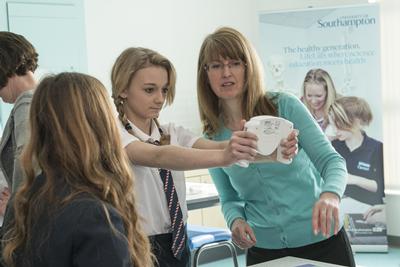New digital game will help teenagers eat better and get active

Teenagers across Southampton are to create a new gaming platform that will encourage them to eat smart and get active.
In a new project led by the University of Southampton, teenagers who are taking part in the LifeLab programme will be asked to develop the digital game, alongside health researchers, scientists and professional game developers.
Ideas and formats will be given to in-game designers at Glasgow Caledonian University (GCU) who will create the game and then bring it back to LifeLab for testing.
The aim is to educate young people about the impact their lifestyle choices have on their health and the health of their future children and encourage them to improve their diet and exercise habits.
Associate Professor Mary Barker, who is leading the project, said: “Gaming is one of the UK’s largest new industries that has the power to influence young people to become more active. We want to harness that power and create something new and exciting that will encourage young people to make better decisions about their diets and to become fitter and healthier.”
The £2.2m project is being funded by the National Institute for Health Research (NIHR) Programme Grants for Applied Research Programme.
Alongside University health researchers, teenagers will be asked to come up with concepts and designs. The game will take inspiration from social media such as Snapchat, fitness apps and successful real-world games such as Pokémon Go to create an experience that helps teenagers take control of their own exercise and healthy eating behaviours.
As part of the research programme, whole classes of teenagers who have been through LifeLab will be offered support back in school from specially trained teachers and will be encouraged to use the new game to help them change their eating habits and be more active. Associate Professor Barker’s team will assess how successful this is in improving teenagers’ lifestyles.
Part of the NIHR Southampton Biomedical Research Centre, LifeLab is a unique teaching laboratory at University Hospital Southampton, dedicated to improving adolescent health by giving school students opportunities to learn first-hand the science behind health messages.
David Farrell, lecturer in games design at GCU, said: “Game designers harness the power of play to have gamers undertake all kinds of weird and wonderful activities. We are going to tap into this process to find ways to help people really enjoy themselves as they try to live healthier lives.
“There hasn’t been a more successful health game than Pokémon Go, and of course, it succeeded because players were entranced by the experience that game offered. With this project, we are hoping to design an experience for teenagers that feels authentically playful and fun, while still managing to support their self-directed goals of improving their health.
“It’s a real privilege to have the opportunity to work alongside our colleagues at the University of Southampton who are experts in behaviour change. We think that by bringing together their deep understanding of psychology with our best practice in iterative, concentric, player-centric game design there is a real chance we could create something special in the world of health gaming.”
Hazel Inskip, professor of statistical epidemiology at the University of Southampton and joint leader of the project, added: “This is a very exciting development for LifeLab, which has been running very successfully in our new facility in Southampton since 2013. We look forward to working to improve teenagers’ health with colleagues from Glasgow Caledonian University who are experts in this creative new area of science.”

